If you’re like me, you’ve probably faced the frustrations that come with hard water. Those pesky calcium deposits, dull-looking hair, and even soap that refuses to lather properly—it’s a struggle, right?
After dealing with these issues for what felt like forever, I decided it was time to look into a water softener for my home. That’s when I came across the Puronics Water Softener.
In this review, I’ll walk you through my personal experience with the Puronics Water Softener, comparing it to other brands and sharing tips to maintain your system.
And, if you’re wondering where to get your hands on one, you can easily find Puronics water softeners at authorized dealers or large retailers like Home Depot. Let’s break it all down.
My Experience With Puronics Water Softener
When I first decided to get the Puronics water softener, I was skeptical. I’ve had my fair share of water softeners that either underperformed or required constant maintenance, and I wasn’t sure if this would be any different.
But after living with it for a while, I can confidently say that it’s been a good investment.
- My Initial Impressions
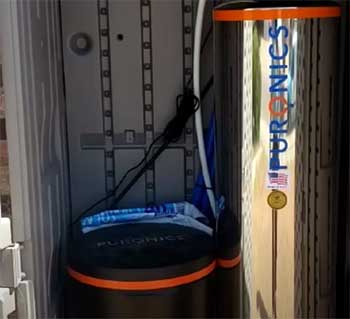
When the system was installed, I was immediately struck by how quiet it was.
I’ve had water softeners in the past that made all kinds of noises during the regeneration cycle, but the Puronics Terminator iGen was barely noticeable.
The first thing I checked was the water quality—did it really make that much of a difference?
After just one day, the improvements were noticeable.
- The Shower Experience
For me, the biggest difference was in the shower. Before the Puronics water softener, I struggled with the usual hard water issues—dry skin, soap that didn’t lather properly, and that annoying residue on everything.
After installing the system, my skin felt noticeably softer, and the soap lathered like it should. My hair also looked shinier, and the scalp dryness I usually dealt with was gone.
That experience alone made me realize how much hard water had affected my daily routine. It wasn’t just about softer clothes or clearer dishes (though that was a plus too). It was about feeling better overall, like I was taking a shower in softer, cleaner water.
- Water Taste and Drinking
Another pleasant surprise was the improvement in water taste. I used to avoid drinking water straight from the tap because it had a slight metallic taste, and I relied on bottled water or a separate filtration system.
But with the Puronics softener, the tap water tasted much cleaner. It didn’t have that chlorine aftertaste or metallic edge anymore, which made drinking water directly from the tap much more enjoyable. I even got rid of my countertop filtration pitcher because I didn’t need it anymore!
- Appliance Longevity
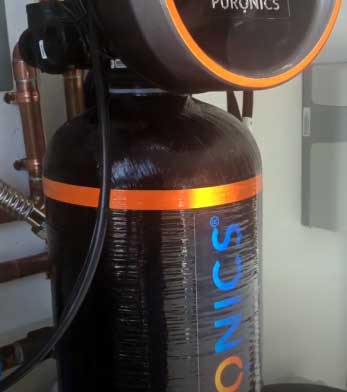
I was really curious about how the system would affect my appliances.
Hard water had been a constant issue with my washing machine and dishwasher, leaving white residue on dishes and even clogging up my showerhead over time.
After installing Puronics, the residue on my dishes completely disappeared, and I haven’t had to clean my showerhead as frequently.
While it’s still too early to judge the long-term effect on my appliances, I’ve already seen small changes that make a big difference.
For example, the water pressure in my shower hasn’t dropped since installing the softener, and my dishwasher’s performance has noticeably improved.
There’s no more white buildup, and my glasses come out crystal clear, which never happened with hard water.
- The Smart Features
One of the coolest aspects of the Puronics system is its iGen smart technology. The system monitors itself, telling you when it needs maintenance or when the filters need changing. I loved that I didn’t have to guess if something was wrong.
The control valve even adjusts based on my water usage, which I thought was pretty neat. It also tracks how much water I’m using, so I can see if there are any spikes or drops that might indicate an issue.
At one point, the system alerted me that it needed maintenance, and I appreciated the heads-up. Instead of waiting until I noticed problems with my water, I was able to address it quickly and keep the system running smoothly.
- What I Wish Was Different
That said, no system is perfect. I’ve already mentioned that the initial cost was higher than some of the other brands I looked at, and the need for professional installation added to the expense.
But looking back, I think the upfront cost was worth it, given the consistent performance and long-term benefits.
I did wish, however, that the replacement filters were a little more affordable. They’re easy to find, but the costs do add up over time. It’s something to factor into your decision if you’re thinking about getting a Puronics system.
Pros of the Puronics Water Softener
- Efficient Hard Water Treatment
One of the biggest pros of Puronics water softeners is their ability to treat hard water effectively. From my personal experience, after installing the system, I noticed an immediate improvement in my water quality.
The minerals that used to leave residue on my faucets and appliances were no longer an issue. The water felt smoother, and I could tell the difference, especially when showering or washing dishes.
- Advanced Filtration System
What sets Puronics apart from other water softener brands is its multi-layer filtration. Besides just softening your water, it removes harmful impurities like chlorine, heavy metals, and sediment. It’s like getting a water softener and a purifier in one system.
I also found that the improved taste of the water was an unexpected bonus. No more buying bottled water!
- Low Maintenance
Maintaining a water softener can often be a hassle, but Puronics seems to have found a way to make it as easy as possible. The iGen control valve monitors the system’s performance and lets you know when maintenance is required.
So, instead of waiting until you notice issues with your water, the system gives you a heads-up when something needs attention. In my case, this proactive feature has saved me from unexpected downtime.
- Long Warranty Period
Puronics offers a solid warranty on its water softeners, giving you peace of mind. The lifetime warranty on the stainless steel tanks speaks to the confidence they have in their products.
From my own research, very few companies back their products as confidently as Puronics does.
Cons of The Puronics Water Softener
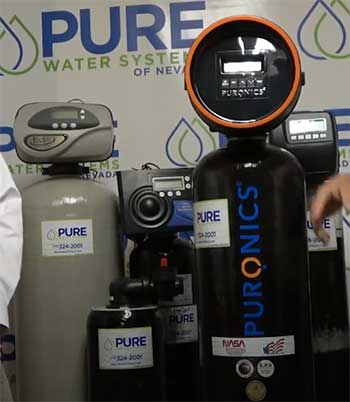
- Higher Initial Cost: One of the main drawbacks I’ve noticed with Puronics is its cost. The upfront price is higher compared to some other brands like Whirlpool or Pelican. If you’re on a budget, this might be a big consideration. However, considering the added filtration and durability, I personally found it to be worth the investment.
- Requires Professional Installation: While some brands offer DIY installation, Puronics recommends professional installation to ensure everything works correctly. I had to arrange for a technician to come out, and while it was hassle-free, it added to the overall cost of getting the system set up. If you’re someone who prefers DIY projects, this might be a limitation.
- Ongoing Maintenance Costs: Though the maintenance is fairly low, it’s not entirely cost-free. Every few years, you’ll need to replace the filters and cartridges, which adds to the ongoing expenses. I didn’t mind this too much, as I see it as the cost of keeping my system running optimally, but it’s something to keep in mind when budgeting.
Maintenance Tips For Puronics Water Softeners
Maintaining your Puronics water softener ensures it runs smoothly and lasts longer. Based on my experience, here are a few practical maintenance tips:
- Monitor Salt Levels (If Applicable): Some Puronics models use salt-based technology, though the iGen model I’ve used doesn’t. If your model requires salt, check the levels regularly and top it up as needed. The system should alert you, but it’s always good to stay ahead of it.
- Change the Filters Regularly: Even though Puronics systems are low maintenance, the filters still need to be changed to keep the water clean and safe. Follow the manufacturer’s recommendation, which is usually every 6 to 12 months, depending on your water quality.
- Keep an Eye on the Control Valve: The iGen control valve will let you know when something’s off. If you notice any unusual readings or alerts, don’t ignore them. It’s always easier to fix a small issue before it becomes a big problem.
- Annual Check-Up: Although the system doesn’t need much attention, having a professional come in for an annual check-up can be a good way to ensure everything is in top shape. I did this after the first year, and the technician gave it a clean bill of health.
Comparing Puronics With Other Water Softener Brands
When it comes to water softeners, there’s no shortage of options on the market. However, I wanted to focus on how Puronics stacks up against other leading brands like Morton 45000 Water Softener and Hydrotech 765 Water Softener.
Each brand offers unique features, and depending on what you’re looking for, one might be better suited to your needs than the other.
- Puronics Vs. Morton 45000 Water Softener
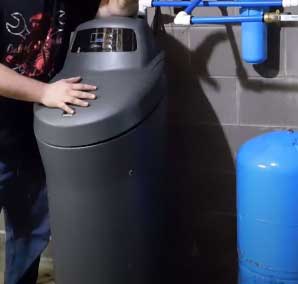
Morton is a popular choice for homeowners who want a budget-friendly water softener with reliable performance.
The Morton 45000 Water Softener is one of their top models, designed to handle large households and moderate to high levels of water hardness.
It’s an affordable option, and the fact that it’s available at most big-box stores makes it accessible.
However, while Morton softeners are effective at reducing hardness, they don’t offer the advanced filtration system that Puronics provides. Morton focuses primarily on softening water by using salt to remove calcium and magnesium ions.
On the other hand, Puronics softeners not only soften water but also filter out impurities like chlorine, sediment, and heavy metals, thanks to their multi-layer filtration system.
In my experience, if you’re looking for a straightforward, affordable water softener, Morton could be a good choice. However, if you want a system that does more than just soften water, Puronics stands out with its enhanced filtration capabilities.
The taste of my water improved significantly with Puronics, something I didn’t notice with basic softening systems like Morton.
- Puronics Vs. Fleck 5600SXT Water Softener
Fleck water softeners are known for their durability and cost-effectiveness, with the Fleck 5600SXT Water Softener being one of their flagship models.
This system is highly regarded for its robust design and efficiency in softening water for medium to large households. Fleck systems are also a bit more DIY-friendly, which makes installation easier if you prefer a hands-on approach.
However, Fleck primarily focuses on water softening without the additional filtration features that Puronics provides. Fleck’s system is excellent at reducing hardness, but if you’re also concerned about removing chemicals and contaminants from your water, Puronics is the better option.
One feature that Fleck does offer, which I found appealing, is its user-friendly control head. It’s simple to operate, and you can easily adjust settings to fit your household’s specific water usage.
But in the end, if you’re looking for something that goes beyond just softening and addresses overall water quality, Puronics’ advanced filtration still gives it the edge.
- Puronics Vs. Hydrotech 765 Water Softener
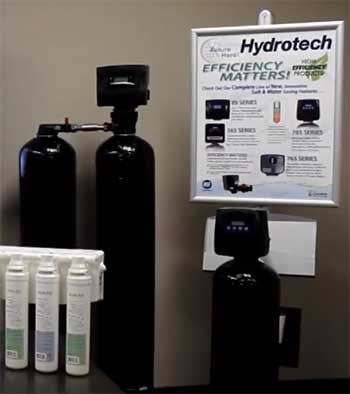
The Hydrotech 765 Water Softener is another solid competitor in the market, known for its compact design and energy efficiency.
It’s a great option for those who want a space-saving unit that gets the job done without consuming too much water or electricity.
One thing Hydrotech does well is automation.
Much like Puronics, Hydrotech softeners have smart controls that monitor water usage and regeneration cycles, optimizing efficiency.
However, Hydrotech systems are more focused on basic water softening, much like Morton. While the Hydrotech 765 is great at removing hardness, it lacks the advanced filtration capabilities that Puronics offers.
In terms of installation and maintenance, Hydrotech is relatively easy to manage, but it requires salt like most traditional systems.
Puronics, on the other hand, offers salt-free models, which is a plus for anyone looking to reduce salt consumption in their home or live in areas where salt-based softeners are restricted.
If energy efficiency and a smaller footprint are important to you, Hydrotech might be worth considering. However, if you’re more interested in improving your water’s overall quality and want a comprehensive system, I would recommend Puronics.
The filtration technology in Puronics simply offers more for those who care about both softening and purifying their water.
Frequently Asked Questions (FAQ)
From my research and personal experience, Puronics ranks high as one of the most reliable water softener brands. It combines effective hard water treatment with advanced filtration, and the systems are built to last with a lifetime warranty on the tanks.
Yes, Puronics is still in business and remains a well-regarded brand in the water treatment industry. They’ve been around for decades, continuously improving their products and maintaining a strong customer base.
Puronics has been in business for over 70 years, making it one of the more established names in water softening and filtration systems. This longevity speaks volumes about the brand’s reputation and product quality.
While there are many great brands out there, Puronics stands out for its advanced filtration technology and high-quality systems. If you’re looking for a comprehensive solution that improves water quality across the board, Puronics is one of the best options on the market.
Conclusion: Should You Buy a Puronics Water Softener?
In my experience, the Puronics water softener has been a game-changer. The combination of advanced filtration and reliable water softening makes it a standout option, especially if you’re looking to improve your overall water quality.
While the initial cost might be higher than other brands, I found the performance and added filtration benefits to be worth every penny.
If you’re tired of dealing with hard water and want a comprehensive solution that not only softens but also purifies your water, I would recommend considering Puronics. You can find Puronics systems at authorized dealers, as well as through retailers like Home Depot or Amazon.
